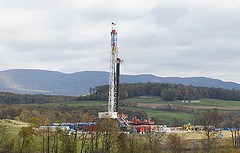STATE COLLEGE – Department of Conservation and Natural Resources Secretary Cindy Adams Dunn has updated members of the Natural Gas Advisory Committee on the department’s ongoing efforts to monitor natural gas extraction and management on DCNR lands.
“Our Bureau of Forestry continues to provide updated information on the shale-gas industry and its effect on state forestlands, focusing most recently on infrastructure and associated acreages in its core shale-gas state forest districts,” Dunn said.
“These updates to our Bureau of Forestry Shale-Gas Monitoring Program, to be supplied on a regular basis, are designed to help the committee continue providing valuable insight and expertise concerning the complex nature of natural gas management.
“As part of its overarching goal of ensuring sustainability of Pennsylvania’s forests, DCNR established this program to monitor, evaluate, and report on the impacts of shale-gas development to the state forest system and its stakeholders,” Dunn said. “It aims to provide objective and credible information to the public and inform and improve shale-gas management efforts.”
Noting the natural Gas Advisory Committee was formed to “help identify concepts, best practices and principles — and assist in integrating them into the department’s natural gas management efforts on DCNR lands,” Dunn said, “This monitoring update focusing on infrastructure is snapshot of what our experts are tracking in the forest districts affected by the natural gas industry through December 2014.”
Key points outlined by the secretary to the 21-member committee included:
- In 2013, 79 new wells were approved for drilling on state forestland and 47 in 2014. Through the end of 2014, a total of 1,020 wells have been approved. To date, 608 wells have been drilled on state forestland;
- In 2013, 19 new infrastructure pads (encompassing 73 acres) were constructed. Eight new infrastructure pads (32 acres) were constructed in 2014. Since the onset of gas development, 755 acres have been converted for infrastructure pads;
- Overall, four miles of new roads were constructed in 2013. In 2014, less than one mile of new road was constructed, bringing the total miles of new roads to 36 since 2007. Acreage converted for new roads and road modifications in 2013 totaled 22 acres; 16 acres in 2014. A total of 259 acres have been converted for new road construction and road modification to accommodate gas development;
- A total of 49 acres were converted for pipeline rights-of-way; 66 acres in 2014. Since 2007, 661 acres have been converted to pipeline ROW in these districts;
- Total acreage converted to non-forest in the core gas districts in 2013 was 144 acres. For 2014, 114 acres were converted. Total conversion acreage for all types of development in the core gas districts since the onset of shale gas development is 1,674 acres.
Detailed information, along with a variety of graphics, can be found in the Infrastructure chapter of the bureau’s Shale Gas Monitoring Report on the DCNR Web site. Background and summarized data from 2007 to 2012 can be found online.
The Natural Gas Advisory Committee was formed to advise and provide recommendations for implementing natural gas management in a manner consistent with the mission of DCNR and its bureaus. DCNR’s Bureau of Forestry assumed lead responsibility for coordinating and facilitating its work.
NGAC is made up of 21 experts from a variety of backgrounds and organizations, including conservation groups, universities, gas industry, environmental consultants and recreation-related organizations.
“We look forward to continuing to work with representatives on the advisory committee to continually review, examine, and improve our best management practices related to gas development,” Dunn said.
For more information about gas development on state forest lands visit the DCNR Web site at www.dcnr.state.pa.us and choose “Gas Development on State Forests” under “Quick Links.”
